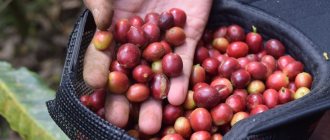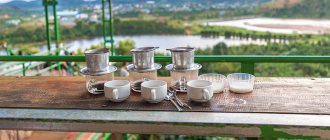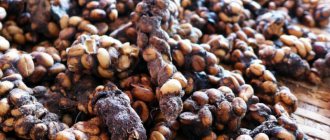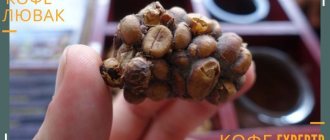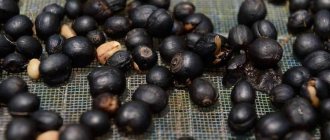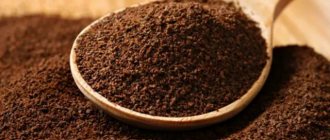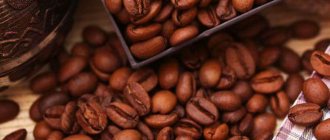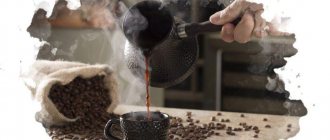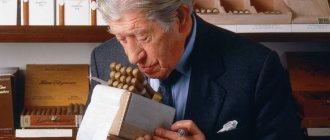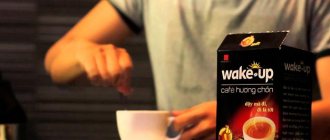Types of coffee, Brands of coffee
Add a comment
If you haven’t seen it, be sure to watch an excellent American film starring Jack Nicholson and Morgan Freeman called “Until I Played the Box.” One of the heroes of the film, a millionaire and a big snob, was very fond of periodically drinking exquisite Luwak coffee - the most expensive coffee in the world.
Good day, friends.
We recommend drinking this drink from the Czech Leander porcelain set
What is Luwak coffee?
The elite variety of coffee Luwak received its name from an animal native to South Asia, thanks to which the origin of the product became possible. A representative of the civet family is called luwak, common musang, civet or palm marten. The gray omnivore with black stripes and spots is nocturnal and loves coffee berries.
According to legend, one peasant from the island of Sumatra ate all the fruits from the coffee trees. Shocked by what happened, he noticed that the animals left behind feces with whole coffee beans. He had no choice but to extract them from the excrement and use them for his own consumption.
According to other sources, the history of this variety began in the 18th century, when the Dutch founded coffee plantations on the islands of Sumatra and Java. In 1830, a decree was issued prohibiting local residents from consuming the fruit. To avoid paying huge fines, peasants began extracting coffee from civet feces. The extracted beans were washed, fried, crushed and a delicious aromatic drink was brewed.
Rumors about this miracle product quickly reached the Dutch. They also liked the taste of fermented grains, but the owners of the plantations for a long time did not dare to publish the unusual production technology. Kopi Luwak entered the world market only after World War II.
The secret of bean processing technology lies in the digestive process that occurs in the body of palm martens. Gastric juice dissolves the outer shell of the grains, and under the influence of special microflora, multi-stage fermentation occurs in the intestines. The musk secreted by the civet's stomach gives the product a special taste and aroma, and removing the shell and breaking down the oils reduces the bitterness and makes the taste less harsh.
The main consumers of Kopi Luwak are Japan, Hong Kong, and the UK.
Black tusk
Another product that can challenge the title of the most expensive coffee in the world is Black Tusk. It is produced in Thailand and three regions in the Maldives. Already from the name it is clear which animal is an important link in the coffee production chain. This is an elephant. He is also not averse to eating coffee berries.
The coffee production technology is similar to the Indonesian Kopi Luwak. The elephant eats grains, or rather berries, which, passing through the digestive tract, undergo a kind of fermentation. Next, they are extracted from the feces, washed, dried and fried. Digested grain in a volume of 1 kg is obtained from more than 30 kg of berries.
The elephant loves fruits and berries, so Black Ivory has a mixture of their tastes and aromas
The drink made from taki grains has a rich fruity taste and aroma, it contains floral, chocolate and nutty notes at the same time. There is no bitterness, but no sourness either. It is gentle and soft, as a good Arabica should be. This variety of coffee is known throughout the world as Black Ivory; its price reaches $500–600 per 500 grams.
How it is produced
Palm martens do some of the work for the peasants. In the stomachs of animals, selected ripe berries are freed from pulp and fermented. Undigested grains leave the body of the musang naturally along with excrement.
Farmers who pass on their business from generation to generation carry out further processing:
- the droppings are collected, laid out on flat horizontal surfaces until completely dry, and stirred periodically;
- Selected beans are manually separated from feces;
- washed in several waters, dried in the sun;
- fried in different ways.
The raw materials are obtained from wild musangs fed on plantations or kept in captivity on animal farms. Civets are able to eat up to 1 kg of large red berries with a sweetish taste. The stomach cannot cope with such a volume of food and some of the beans come out undigested.
What is the reason for the high price?
The high price tag for Luwak is explained not only by the complexity of processing. The formation of cost is influenced by the following factors:
- An adult civet cat living on a farm defecates feces containing no more than 50 g of beans. Animals choose only ripe berries from the offered ones, the rest are disposed of.
- To search for wild musang droppings, we need trained people who receive decent wages for their work.
- Kopi Luwak is made from March to September, when the stomach juice of palm martens produces a substance called civet, which changes the taste of the grains. The rest of the time production is idle.
- Musangs do not breed on farms. In September they are released into the wild, and in the spring of next year new individuals are caught in the tropical forests. The animals are smoked out of holes or hollows where they hide during the daytime.
Keeping civets is expensive for nursery owners. We have to pay wages to workers serving animals and coffee plantations. Since the musangs' diet consists not only of coffee berries, they are bought other products - chicken, eggs, fruits, and vegetables. Civets are under constant veterinary supervision, which significantly increases the cost of the final product.
The average retail price of Luwak coffee is $400–600, and the wholesale price is $100. Coffee beans fermented by wild animals are not commercially available. They quickly sell out at auctions at prices of 4–6 thousand dollars per kilogram.
What animals ferment coffee beans?
The varieties of coffee depend on the type of animal in whose digestive tract the beans underwent primary processing. Malayan palm civets, Indonesian monkeys, Thai elephants, Brazilian Jacu birds and even bats help to do business in the production of this product.
Coffee made from musang excrement
In first place in popularity in the ranking of the most elite varieties is Kopi Luwak. Small animals, vaguely reminiscent of a ferret, marten or cat, spend most of their lives in trees, which explains their love for coffee cherries. They move from branch to branch, eating the most delicious berries along the way.
Gourmets call Kopi Luwak the drink of kings or the nectar of the gods, emphasizing the unique taste and aroma of the variety.
Of the total amount of fruit eaten, only 5% remains undigested. So they are extracted from fecal matter manually. For sale, grains of the same size and correct shape without deformation or damage are selected. In order to successfully compete in the market with other elite varieties, the beans undergo multi-stage sorting.
Some energy drink lovers are confused by the extreme production method. According to the manufacturers, there is nothing harmful in the product, since it undergoes multiple hygienic cleaning.
Coffee trees also grow in Ethiopia and common musangs live. But due to different climatic conditions, the Ethiopian fermented product is inferior to the Indonesian in terms of richness of taste and smell.
In Vietnam, coffee made from palm marten feces is called Chon. The local population considers the drink made from beans extracted from feces to be not only tasty, but also healthy. The production method of this variety is identical to the Indonesian one, but is brewed in a different way.
The price of the most expensive Terra Nera coffee, which is divided into 6 varieties depending on the method and intensity of roasting, reaches up to 20 thousand dollars. It is sold by the Harrods department store in London for snobs who want an exclusive drink in the morning.
Beans from the southeastern part of the Peruvian Andes, treated with civet in the stomachs of musangs, are distinguished by a chocolate-nutty taste. The beans are packaged in bags with valves to prevent loss of aroma. The most expensive variety, Terra Nera, is packaged in silver bags with gold plating on the inside and tags that display information about the supplier and the degree of roasting. Packaging for Peruvian coffee is made by famous craftsmen in precious metals. When purchasing a product weighing at least 0.5 kg, a coffee maker is included as a gift.
Elephant feces coffee
The founder of the Black Ivory Coffee Company, Canadian Blake Dinkin, decided that using palm civets to process beans in captivity was unethical; elephants would be better suited for this role. To begin with, he involved a veterinary service and made sure that the Thai giants do not absorb caffeine from the berries, since the alkaloid is released at temperatures above 70 °C.
On the territory of a Thai nature reserve, Dinkin organized the first production of fermented coffee beans and soon registered a new variety, Black Ivory, costing $1,100 per 1 kg.
The choice of elephants was not accidental. Animals ensure maximum fermentation of berries. The output of beans with feces is greater than that of small musangs. In addition, during the digestion process, which lasts an average of 24 hours, the beans are imbued with sweet aromas from their proximity to sugar cane and fruits, which improves the taste and increases the cost of the final product.
Elephants are fed up to 35 kg of Arabica per day, resulting in 1 kg of beans extracted from elephant feces. They are washed, dried and sent to Bangkok for further processing.
The drink at $50 per cup can be tried in the north of Thailand, in expensive hotels in the Maldives and Abu Dhabi. For retail, the product goes to supermarkets in Phuket.
The high price of Black Ivory is explained by small production (30 elephants are involved in the process), care for animals, and the difficulty of collecting fermented raw materials. A tenth of the profits from the sale of “Black Tusk” goes to the elephant health fund.
Monkey feces coffee
Monkey Coffee is produced in Taiwan and the Indian state of Karnataka, where 60% of the country's coffee plantations are concentrated. The coffee production process involves Taiwanese endemics - Formosan rock macaques and rhesus macaques from India, which often raid coffee trees and eat the crop. Farmers suffered losses for a long time until they figured out how to make coffee from beans spat out by animals.
Macaques not only eat the sweet pulp of the berries, but also chew the shell and ferment the hard core with saliva, which remains intact. Partially digested beans turn from green to gray.
Plantation workers collect the grains left behind by the monkeys, wash, dry, and fry. The result is a sweetish coffee of medium acidity with notes of caramel and vanilla. The price of 1 kg of Monkey Coffee is $700.
Bird droppings coffee
In the south-east of Brazil, in the province of Esperito Santo, birds similar to guinea fowl, called Jacu, live. Wild pheasants with dark plumage, listed in the Red Book, often visit shady coffee groves and, year after year, destroy the harvest of sweet berries with impunity.
Farmer Enrique Sloper tried to fight the feathered pests for several years to no avail, and even contacted the local police. But everything changed in 1999, when the owner of a coffee plantation noticed undigested beans in Jacques' droppings. The birds selected selected ripe berries, leaving small and green ones on the branches.
Overcoming disgust, Sloper extracted the semi-digested, enzyme-rich hard kernels with dissolved shell from the excrement. After hygienic procedures, roasting and grinding, I prepared a drink, which I tried myself and treated to friends.
Everyone who drank this aromatic coffee was satisfied with the original taste and smell. The variety, called Jacu Bird, brought worldwide fame to Sloper, owner and founder of Camocim organic coffee Company.
Gourmets describe the aroma as chocolate-anise, and the taste as associated with fruit, brown bread, lemon balm and coconut milk.
The cost of 1 kg of Jacu Bird Coffee is 28–30 thousand rubles. The grains are packaged in foil bags with a valve, which are placed in jute bags. The drink is prepared in geyser coffee makers, French presses, and Turks.
Taste of the drink
The taste of coffee is affected by:
- age, sex of animals;
- living conditions;
- daily ration;
- roasting method;
- storage conditions;
- water quality;
- recipe.
The most delicious drink is obtained from beans fermented by young male musangs living not on farms, but in the wild.
The stomach juice of civet cats contains the aphrodisiac musk. Its components enrich the grains with a floral, honey-fruit aroma, which cannot be achieved artificially. The drink does not give any sourness or harsh sensations. Its taste is soft and balanced.
The fruity-caramel aftertaste with notes of chocolate lasts up to four minutes. Unlike classic Arabica, Luwak has less bitterness and astringency and has more flavor nuances.
Luwak coffee reviews
As most gourmets admit, the described drink causes mixed reactions. Not everything is pleasant and good, which is expensive. So, Luwak coffee reviews:
- a girl wrote on one of the forums that what always stopped her from purchasing Luwak coffee was the originality of production and the number of counterfeits (and in Russia this is generally a problem!). Apparently I bought a lot of materials and videos on this topic. My intuition didn’t let me down, I bought a quality product. Appreciated him;
- She is echoed by a guy who admits that the coffee is excellent, the taste attracted him with a slight sourness, which does not spoil the taste, but, on the contrary, complements it. It’s expensive to drink such a drink every day, but on weekends it’s just right;
- a group of friends tasted coffee, each of them was satisfied. What was especially striking was that the drink completely lacks the bitterness inherent in regular coffee. The aroma is subtle and pleasant. The only problem is the hefty cost of the product;
- another guy admitted that he was thinking about how he could spend so much money on coffee! Coffee! It turned out that the taste is more than unusual - soft, and seemingly weightless;
- Among the words of praise there are also critical ones. There are people who claim that Luwak coffee tastes simply disgusting. Firstly, lifeless, secondly, faded. So, not for everyone...
How to make coffee from litter
Unlike Europeans, Indonesians do not use coffee machines and Turks to prepare the drink. Coffee powder is brewed like tea in a teapot or heated ceramic cup, and coarsely ground beans are brewed in a French press.
For 1 serving you will need 8 g of ground coffee and 160 ml of water at 80 °C. The drink is considered ready after 3 minutes, when the grounds settle to the bottom. In Vietnam, Chon is prepared differently.
Method No. 1
A little condensed milk is poured into a cup. A filter is installed on top, into which 10 g of fine or medium-ground grains are poured. The powder is pressed with a press and 100 ml of boiling water is poured.
Method No. 2
In hot weather, the Vietnamese prefer to drink a cold drink. To prepare it, you will need a tall glass with ice instead of a cup of condensed milk, a filter with a press, 10 g of Chon and 100 ml of hot water. The cooking technology is the same as in the first case.
In Vietnam, it is customary to serve green tea in addition to fermented coffee.
.
Geyser coffee makers and Italian coffee machines are not suitable for preparing an expensive drink. Trying to make a cappuccino or latte is a fool's errand. To experience the complex bouquet of flavors and preserve the beneficial qualities, simple Asian cooking methods are used.
A little history of Vietnamese coffee
Few people know that Vietnam is the world's second largest coffee , giving the lead to the largest producer - Brazil. Along with baguettes and the alphabet system, the first coffee trees were brought to the Asian country by Catholic missionaries in the 19th century . Vietnam was then a French colony. It was difficult to grow on small farms, and to be honest, the Vietnamese did not like it.
Modern coffee has found many admirers. Today, it is the main consumption and export product of the small Asian country. Good coffee in Vietnam is a strong, sweet drink.
If you order it in a cafe, you should definitely inform them that you drink it without sugar.
Since the end of the 20th century, Vietnam has demonstrated constant growth rates in coffee production, and it continues to grow relentlessly. According to the International Coffee Organization, the number of drinkers of the invigorating drink in Asia has doubled since 1990 . More than eighty countries around the world purchase their coffee products annually. For the Vietnamese themselves, the drink has become not just a product, but a national idea. Everyone has long been confident that Vietnam will not give up its leading position in the production of high-quality coffee.
The benefits and harms of the drink
Coffee made from animal droppings is not inferior to classic Arabica coffee in its positive effects on the body.
Useful properties of Kopi Luwak:
- invigorates, gives a surge of energy;
- increases physical and mental activity;
- accelerates lipid metabolism, helps get rid of excess weight;
- regulates insulin levels in the blood;
- antioxidants in the composition bind and remove free radicals, inhibit aging, prevent the formation and development of cancer cells;
- protects the liver from cirrhosis;
- removes excess fluid due to the diuretic effect;
- stimulates the outflow of bile from the gallbladder;
- reduces the risk of Alzheimer's and Parkinson's diseases;
- reduces cravings for sweets and other high-calorie foods;
- stimulates the production of its own enzymes;
- improves the microflora of the gastrointestinal tract;
- strengthens immune defense, increases the body's resistance to seasonal infections;
- stops inflammation.
Contraindications for drinking Luwak coffee are the same as for other varieties. It is not recommended to drink the drink for people with heart or vascular diseases, as caffeine increases the number of myocardial contractions and increases blood pressure.
You should refrain from drinking the drink during pregnancy, lactation, diseases of the endocrine system, stomach, intestines, kidneys due to stimulation of the synthesis of cortisol and adrenaline.
The product leads to sleep disturbances, causes addiction and dependence, which require more and more volume to feel an energy boost. In reality, a person gets the opposite result. Due to the depletion of nerve cells, you feel lethargic and your ability to work decreases.
If you drink more than 400 mg of the drink daily, the risk of osteoporosis, circulatory disorders, spinal pain, and damage to tooth enamel increases. Coffee in large quantities interferes with the normal absorption of potassium, magnesium, calcium, thiamine, and pyridoxine.
Which manufacturer is better
A specific technology for processing coffee beans is used by countries that produce the Luwak variety. Elite coffee is produced in Indonesia on the islands of Sumatra, Java, Bali, Sulawesi, Vietnam, the Philippines and India.
The quality of the grains primarily depends on the conditions in which palm martens live. In closed enclosures, pets do not have the opportunity to intuitively choose the best fruits. They eat what they offer. Animals experience stress from changes in their usual habitat, which disrupts the fermentation process. In nature, there are no factors that disrupt digestion; civets eat selected coffee berries.
Consequently, coffee selected from the droppings of wild musangs will be tastier and more expensive. Kopi-luwak Wild, the price of which reaches $6,000, is produced in limited quantities on the island. Sumatra.
Luwak is produced en masse in Vietnamese nurseries. The animals are caught and placed in enclosures for several months until the end of the harvest. They are fed coffee beans three times a week. The quality of the product from farmed musangs is average. The local population calls luwak Chong and sells it for $100 per 1 kg.
Smallholder farming is common in Bali, South India. In the Philippines, production is gradually declining due to the decline in the musang population, which is being exterminated by competing perfume companies.
The closer to the place of production Luwak is purchased, the more likely it is that the coffee has undergone natural fermentation and is not artificially enriched with enzymes.
Cheap counterfeits are identified by their bright aroma and low price of $3–20. To lure buyers, unscrupulous manufacturers impregnate the packaging with vanillin and add flavored oils to the beans during roasting. When the package is opened, a counterfeit can be recognized by grains of different sizes and shapes. The prepared counterfeit drink is bitter and has a weak taste.
When purchasing goods in Russia, you need to request a certificate of quality and conformity with information about the place of production and harvest dates.
Blue Bourbon (from $70 per kg)
Let's start with the innocent Blue Bourbon , which originates in Rwanda. For 1 pound of grains, manufacturers ask up to $35, and considering that 1 pound is equal to 453 grams, a kilogram will cost the buyer more than $70.
Experts characterize Blue Bourbon as a drink with a slight sourness, a very sweet base and a light vanilla aftertaste.
Unfortunately, many people sell cheap varieties under the guise of “Blue Bourbon”, relying on inexperienced customers, so it is very important to check the authenticity when purchasing.
